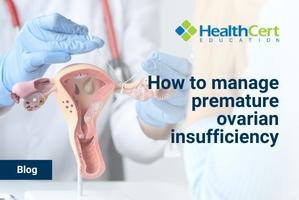How to manage premature ovarian insufficiency
Symptoms, diagnosis & treatment of premature ovarian insufficiency, including health risks such as infertility, CVD, osteoporosis, and more.

HealthCert Education
Premature ovarian insufficiency (POI), often referred to as ''premature menopause'', is the loss of ovarian function before age 40. Spontaneous POI affects an estimated 1–4% of women, with a further cohort of women being affected by secondary or iatrogenic POI caused by surgery, chemotherapy, radiotherapy or hormonal therapies.
For further information on this topic, learn more about the HealthCert Professional Diploma program in Women's Health: fully CPD accredited online women's health training for GPs, quality-assured by Bond University.
Symptoms of premature ovarian insufficiency
POI typically presents clinically with menstrual disturbance (oligo- or amenorrhoea), infertility or menopausal symptoms (e.g. hot flushes, mood changes, genitourinary symptoms, night sweats); however, it can go undetected for many years, particularly if a woman is using hormonal contraceptives.
POI can be associated with chromosomal disorders (e.g. Turner syndrome), autoimmune conditions (e.g. hypothyroidism, Addison's disease), a family history of POI, or environmental factors such as smoking; however, it is most often idiopathic.
Diagnosis of premature ovarian insufficiency
The diagnosis of POI should be suspected in any woman under the age of 40 with more than a four-month history of oligo- or amenorrhoea in the absence of any other cause of secondary amenorrhoea (e.g. pregnancy, use of hormonal contraceptives, anorexia). A formal diagnosis requires testing serum follicle-stimulating hormone (FSH) on at least two occasions at least four to six weeks apart. Two FSH levels in the menopausal range, i.e. >40 IU, indicate POI.
The diagnosis of POI can be distressing to a woman, particularly if combined with a presentation of infertility and women should be offered appropriate psychological support and signposted to useful resources.
Other health risks associated with premature ovarian insufficiency
Further investigation of POI typically requires genetic testing and screening for underlying autoimmune conditions. POI is associated with osteoporosis; therefore, women should be screened for osteoporosis (e.g. via DEXA scan) and bone health optimised (e.g. ensuring vitamin D replacement if required, encouraging regular weight-bearing exercise, smoking cessation). POI is also associated with an increased risk of cardiovascular disease (CVD), and women should be screened for CVD, and any modifiable risk factors addressed.
Treatment of premature ovarian insufficiency
All women with POI should be offered hormone replacement therapy (HRT) with oestrogen in the absence of any contraindications. HRT should be continued until age 50 as it has been shown to lower the risk of osteoporosis and cardiovascular disease in women with POI.
Women with an intact uterus usually require endometrial protection through an oral progestogen or levonorgestrel-releasing intrauterine system.
Fertility and premature ovarian insufficiency
Fertility is often a concern for women with POI. Despite a diagnosis of POI, spontaneous ovulation is common, and absolute infertility cannot be assumed. Therefore, contraception should be recommended in women with POI who do not desire pregnancy. Women who wish to become pregnant should be referred to expert services for consideration of assisted reproductive therapies, which often involve the use of a donor egg or embryo.
The diagnosis and management of POI can be challenging for both the general practitioner and the patient and often involves many months of investigation before a diagnosis can be made and treatment started. In addition, POI is associated with significant long-term health sequelae such as infertility, psychosocial issues, osteoporosis, and cardiovascular disease and often involves a multi-disciplinary team, in which the GP is usually the primary point of contact.
– Dr Samantha Miller, MBChB
For further information on this topic, learn more about the HealthCert Professional Diploma program in Women's Health: fully CPD accredited online women's health training for GPs, quality-assured by Bond University.
References
- Australian Family Physician (2017). Premature ovarian insufficiency in general practice: Meeting the needs of women. https://www.racgp.org.au/afp/2017/june/premature-ovarian-insufficiency-in-general-practic
- International Menopause Society (2020). Premature ovarian insufficiency: an International Menopause Society White Paper https://www.menopause.org.au/images/docs/wmd/Premature_ovarian_insufficiency_an_International_Menopause_Society_White_Paper.pdf
- NHS (2021). Early Menopause. https://www.nhs.uk/conditions/early-menopause/
- BMJ Best Practice (2023). Premature Ovarian Failure. https://bestpractice.bmj.com/topics/en-gb/1004
- National Institute of Clinical Evidence (NICE)(2022). Clinical Knowledge Summary (CKS): How should I diagnose premature ovarian insufficiency? https://cks.nice.org.uk/topics/menopause/diagnosis/diagnosis-of-premature-ovarian-insufficiency/
- Australian Menopause Society (2020). Spontaneous Premature Ovarian Insufficiency https://www.menopause.org.au/hp/information-sheets/spontaneous-premature-ovarian-insufficiency
- Fertility Network UK (2016). Fertility treatment: What the GP needs to know. https://fertilitynetworkuk.org/wp-content/uploads/2016/08/FACTSHEET-Funding-Information-for-GPs-June-2016.pdf
- Australian Journal of General Practice (2020). Assessment of female fertility in the general practice setting. https://www1.racgp.org.au/ajgp/2020/june/female-fertility-in-general-practice-setting
- Daisy Network. daisynetwork.org
- Society of Reproductive Medicine (2015). What is premature ovarian insufficiency (also called premature ovarian failure)? https://www.reproductivefacts.org/globalassets/rf/news-and-publications/bookletsfact-sheets/english-fact-sheets-and-info-booklets/premature_ovarian_insufficiency_poi_aka_pof_factsheet.pdf

 1800 867 1390
1800 867 1390-1.jpg)
.jpg)
-1.jpg)



